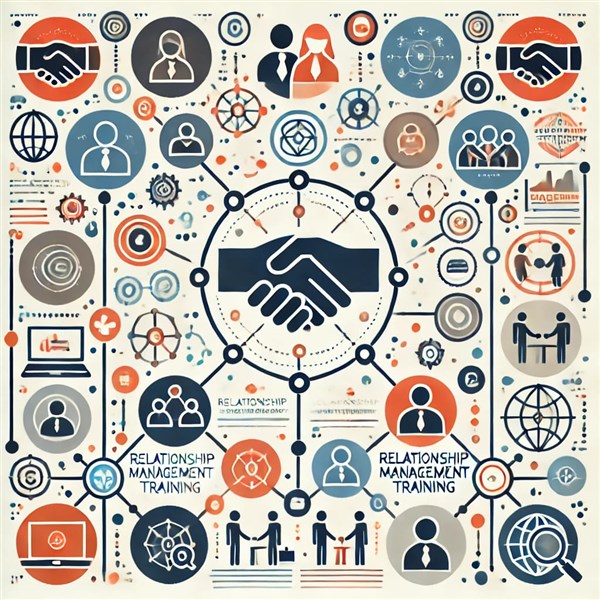Unable to find what you're searching for?
We're here to help you find it
In a business world increasingly driven by automation and data, one truth remains constant: relationships matter. Whether you're nurturing clients, leading a team, or negotiating with partners, your ability to manage relationships effectively can make or break your success.
That’s why relationship management training has become a cornerstone of professional development. It equips individuals with the skills to build trust, communicate with impact, resolve conflict, and cultivate long-term connections.
But what exactly do these training programs teach? In this blog, we explore the core principles taught in relationship management training, and why they’re crucial for anyone who works with people — which, let’s face it, is almost everyone.
Trust is the bedrock of any successful relationship — personal or professional. Relationship management training emphasizes the importance of building and maintaining trust over time.
What You’ll Learn:
Why It Matters:
Clients and colleagues are more likely to work with — and stay loyal to — people they trust. Without trust, even the best intentions fall flat.
Emotional intelligence is the ability to recognize, understand, and manage your emotions — and the emotions of others. It’s one of the most powerful skills taught in relationship management training.
What You’ll Learn:
Why It Matters:
High-EQ individuals are better at resolving conflict, building rapport, and handling feedback — key for any relationship-based role.
You can’t manage relationships if you can’t communicate. Relationship management training focuses heavily on clear, concise, and thoughtful communication across various channels.
What You’ll Learn:
Why It Matters:
Miscommunication is one of the top causes of conflict and disengagement. Strong communication ensures clarity, trust, and progress.
In both B2B and B2C settings, people expect consistency. Relationship management training teaches you how to create predictability in how you interact, deliver, and follow up.
What You’ll Learn:
Why It Matters:
Consistency builds trust and shows others that you're dependable and results-oriented, which strengthens long-term partnerships.
Disagreements are inevitable. The ability to handle conflict constructively — and turn it into opportunity — is a core part of relationship management training.
What You’ll Learn:
Why It Matters:
Professionals with strong conflict resolution skills can preserve and strengthen relationships, even when disagreements arise.
Understanding who your stakeholders are — and what they care about — is essential. Training often includes stakeholder analysis and client relationship mapping techniques.
What You’ll Learn:
Why It Matters:
It helps you engage the right people in the right way, ensuring alignment and reducing friction.
No one likes to be treated like a number. Relationship management training teaches how to personalize communication and tailor engagement based on individual or group needs.
What You’ll Learn:
Why It Matters:
Personalized engagement leads to deeper loyalty, higher satisfaction, and increased lifetime value in business relationships.
Giving and receiving feedback is a vital skill in relationship development. Training helps professionals learn to embrace feedback loops to build better relationships over time.
What You’ll Learn:
Why It Matters:
Feedback, when handled correctly, is one of the most effective tools for growth and trust-building.
In today’s digital-first world, tech tools are an extension of relationship management. Training often includes CRM (Customer Relationship Management) tools, automated check-ins, and communication platforms.
What You’ll Learn:
Why It Matters:
Technology enhances consistency and helps scale relationship-building without losing the personal touch.
In global and diverse workplaces, cultural understanding is key to managing relationships. Training emphasizes how to communicate and collaborate respectfully across cultures.
What You’ll Learn:
Why It Matters:
Respecting cultural differences fosters stronger international relationships and minimizes misunderstanding.
This training is valuable for:
🧭 Final Thoughts
Strong relationships don’t happen by accident — they’re built intentionally through trust, empathy, strategy, and consistency. Relationship management training provides the framework, tools, and mindset needed to build and sustain meaningful, mutually beneficial connections.
Whether you're managing a small team or handling a portfolio of key clients, the principles you learn through training will help you build better relationships, resolve challenges faster, and create more value for everyone involved.
✅ Final Takeaway:
The core principles taught in relationship management training — like trust, emotional intelligence, communication, and personalization — are the cornerstones of professional success in any industry. Invest in mastering these, and your relationships (and career) will thrive.
Koenig Solutions, a leading IT training company, offers top-notch Relationship Management Training. Their comprehensive courses are designed to equip you with the necessary skills and techniques to manage relationships effectively and drive business success. To learn more about their offerings, visit koenig-solutions.com.

Aarav Goel has top education industry knowledge with 4 years of experience. Being a passionate blogger also does blogging on the technology niche.










